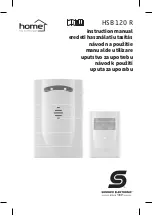
12
ABBRA INSTALLATION
Table 1 - DEFAULT AND PROGRAMMED ZONE DEFINITIONS
Zone
Zone Type
Zone Name
Chime (melody
No.
Default
Programmed
Default
Programmed Zone Name or Off) (*)
1
Delay 1
Front Door
2
Delay 1
Garage
3
Delay 2
Garage Door
4
Perimeter
Back Door
5
Perimeter
Child Room
6
Interior
Office
7
Interior
Dining Room
8
Perimeter
Dining Room
9
Perimeter
Kitchen
10
Perimeter
Living Room
11
Interior
Living Room
12
Interior
Bedroom
13
Perimeter
Bedroom
14
Perimeter
Guest Room
15
Interior
Master Bedroom
16
Perimeter
Master Bedroom
17
Perimeter
Laundry Room
18
Perimeter
Master Bathroom
19
Perimeter
Basement
20
Fire
Fire
21
Fire
Fire
22
Emergency
Emergency
23
Emergency
Emergency
24
24 h / silent
Basement
25
24 h / silent
Office
26
24 h / audible
Attic
27
24 h / audible
Den
28
non-alarm
Yard
29
non-alarm
Hall
30
non-alarm
Utility room
* Note:
All zones are Off-chime by default. Enter your own choice in the last column and program accordingly
.
4.4 DEFINING CONTROL PANEL PARAMETERS
4.4.1 Preliminary Guidance
This mode allows you to customize the control panel and
adapt its characteristics and behavior to the requirements
of the particular user. An illustrated process is shown in
figure 4.4. In this illustration, each selected option is
displayed with a dark box at the right side. To review the
options, repeatedly press <
Next
> or <
Back
> button, until
the desired option is displayed, then press <
View/Select
>
button
.
4.4.2 Entry Delays 1&2
(fig. 4.4, location 01, 02)
Two different entry delays allow the user to enter the
protected site (while the system is in the armed state) via 2
specific doors and routes without causing an alarm.
Following entry, the user must disarm the control panel
before the entry delay expires. Slow-rate warning beeps
start sounding once the door is opened, until the last 10
seconds of the delay, during which the beeping rate
increases. Locations No. 1 (entry delay 1) and 2 (entry
delay 2) allow you to program the length of these delays.
Available options for each delay are:
00s
,
15s
,
30s
,
45s
,
60s
,
3m
and
4m
.
In UL installations, these delays must be 45 s max.
4.4.3 Exit Delay
(fig. 4.4 location 03)
An exit delay allows the user to arm the system and leave the
protected site via specific routes and doors without causing an
alarm. Slow-rate warning beeps start sounding once the
arming command has been given, until the last 10 seconds of
the delay, during which the beeping rate increases. Location
No. 3 allows programming of the exit delay length. Available
options are:
30s
,
60s
,
90s
,
120s
,
3m,
4m
.
In
UL
installations, set exit delay to 30 or 60 seconds.
4.4.4 Bell Time
(fig. 4.4, location 04)
Here you select the length of time the bell (or siren) is
allowed to function upon alarm. The bell time starts upon
activation of the siren. Once the bell time expires, the siren
is automatically shut down.
Available options:
1
,
3
,
4
,
8
,
10
,
15
and
20
minutes.
In
UL
installations, set bell time to 4 minutes minimum,
in canadian installations, set bell time to 8 minutes.
4.4.5 Abort Time
(fig. 4.4 location 05)
Do not use in UL
installations.
Here you select the length of time allowed by the system to
abort an alarm (not applicable to alarms from FIRE, 24H
SILENT, EMERGENCY, GAS and FLOOD zones). The
Abbra is programmed to provide an “abort interval” that
starts upon detection of an event. During this interval, the
buzzer sounds a warning but the siren remains inactive and
the alarm is not reported. If the user disarms the system
within the allowed abort interval, the alarm is aborted.
Available options:
00s
,
15s
,
30s
,
45s
,
60s
,
2m,
3m
,
4m
.
4.4.6 Alarm Cancel
(fig. 4.4, location 06)
Here you determine the ”cancel alarm” period that starts
upon reporting an alarm to the central station. If the user
disarms the system within that time period, a “cancel
alarm” message is sent to the central station.
The options are:
1
,
5
,
15
,
60
minutes
,
4
hours
and also
cancel inactive
.













































